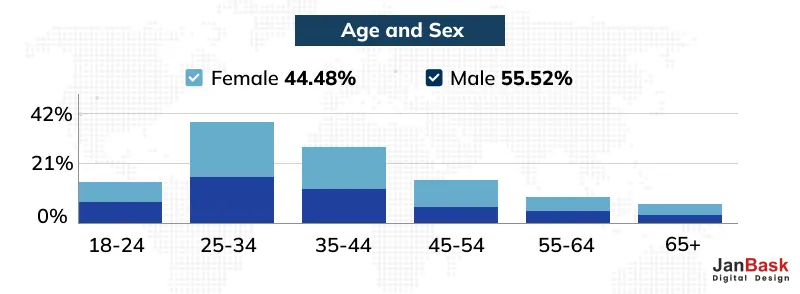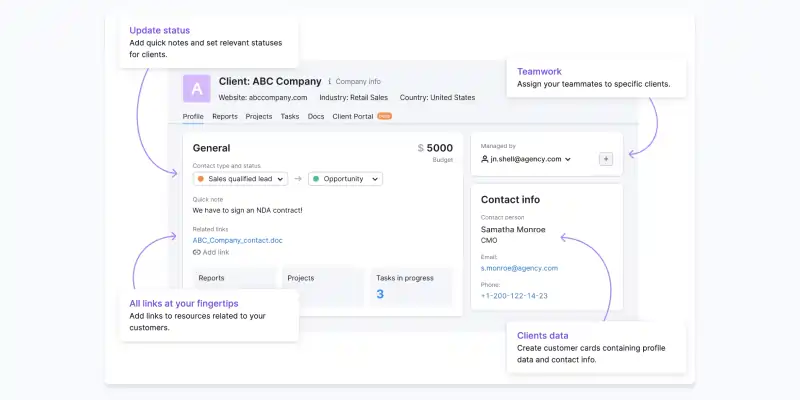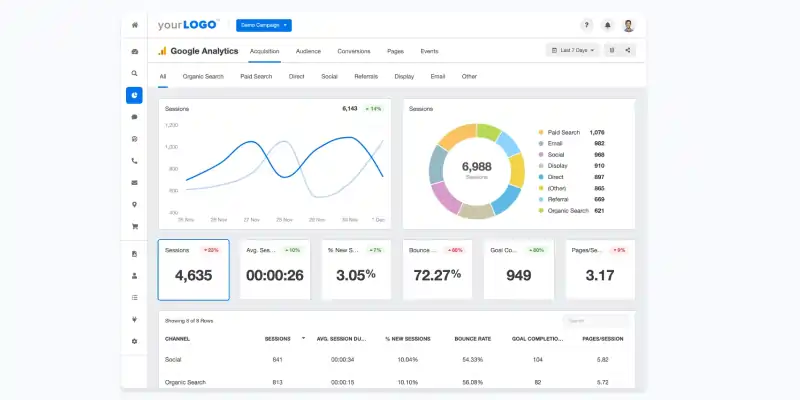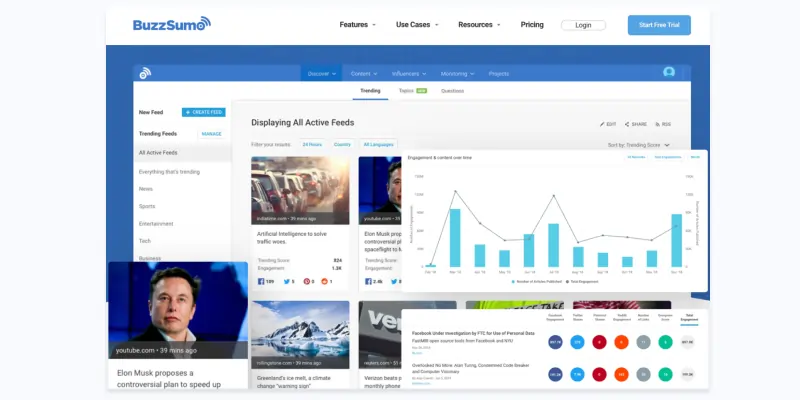
Staying ahead of the curve is not just an ambition—it's a necessity. In a landscape where every decision can make or break your company's future, the need for precision, foresight, and informed choices has never been greater. Enter data-driven marketing, the compass guiding businesses through uncharted territories.
Welcome to a blog tailored exclusively for visionary leaders like you, who understand that data isn't just a buzzword—it's the cornerstone of strategic growth. As the captain of your ship, you need more than just a rough map; you need real-time insights, trends, and actionable intelligence to navigate the complex seas of the market. Data-driven marketing provides you with the tools to steer your organization towards success, whether you aim to increase revenue, expand your market share, or fortify customer loyalty.
If you're ready to elevate your leadership game, maximize your ROI, and lead your organization to new heights of success, join us on this data-driven journey.

Start Building Your Data-Driven Strategy Today!
Do you want to discover how big data could help you deliver a much higher ROI?
According to a HubSpot survey from 2023, 36% of marketers believe data is critical for reaching target audiences and understanding customers, while 32% believe investing in it increases marketing ROI.
Data-driven marketing can be defined within the context of the AIDA model as follows:
Attention: Data-driven marketing involves capturing and analyzing relevant data to grab the attention of your target audience effectively. By understanding customer behaviors, preferences, and demographics through data, you can tailor your marketing efforts to stand out and pique the interest of potential customers.
Interest: With data-driven marketing, you can create personalized and compelling content that aligns with the interests and needs of your audience. Data helps you segment your audience and craft messages that resonate with specific groups, increasing their interest in your products or services.
Desire: Data-driven marketing enables you to cultivate a strong desire for your offerings. By leveraging customer data, you can identify pain points, preferences, and buying triggers, allowing you to tailor your marketing strategies to address these factors and create a sense of urgency and desire among your audience.
Action: Ultimately, data-driven marketing aims to drive action from your audience. Whether it's making a purchase, signing up for a newsletter, or taking any other desired action, data empowers you to optimize your marketing campaigns, channels, and messaging to encourage your audience to take the specific actions you want them to take.
In essence, data-driven marketing in the context of the AIDA model means using data to strategically capture attention, generate interest, create desire, and prompt action from your target audience, leading to a more effective and efficient marketing process.
Marketers earlier used to make decisions based on past experience and gut instincts. While customer surveys provided some guidance, there wasn't much else to go on. Sure, there were trade periodicals that advocated for industry and market trends, but they weren't enough to guide a successful marketing plan.
We now have sophisticated tools at our fingertips that collect and measure data and provide skilled marketers with the insights they need to make the best decisions. Businesses of all sizes agree that it's critical, therefore it's worth spending the time to learn about data-driven marketing and why it is critical for any business.
Data-driven marketing is a powerful tool for understanding your target audience in depth. It leverages data analytics, insights, and information to provide a comprehensive view of your customers, allowing you to tailor your marketing strategies effectively. Here's how data-driven marketing helps in understanding your target audience:
Demographic Profiling: Data-driven marketing enables you to collect and analyze demographic data such as age, gender, location, income, and education level. This information helps you create customer personas, which are detailed representations of your ideal customers.
Behavioral Insights: By tracking customer behavior, such as website visits, interactions with emails and social media, and purchase history, you can gain insights into what your audience is interested in and how they prefer to engage with your brand.
Segmentation: Data allows you to segment your audience into distinct groups based on shared characteristics or behaviors. This segmentation helps you deliver targeted messages and offers to different subsets of your audience, increasing the relevance of your marketing efforts.
Personalization: Personalization is a key aspect of data-driven marketing. Using data, you can tailor content, product recommendations, and marketing messages to individual customers. This not only improves engagement but also fosters a stronger connection with your audience.

Data-driven marketing helps find and develop buyer personas:
Data Collection: Data-driven marketing involves gathering extensive data about your customers and prospects. This data includes demographic information, online behavior, and purchase history. These data points form the foundation for creating buyer personas.
Segmentation: Data analysis allows you to segment your customer base into distinct groups based on shared characteristics. These segments often align with different buyer personas. For example, you might identify segments like "Young Professionals," "Stay-at-Home Parents," or "Retirees."
Behavioral Insights: By analyzing customer behavior, you can gain valuable insights into their preferences, pain points, and motivations. Data-driven marketing helps you understand what drives individuals to make purchasing decisions and how they interact with your brand.
Content Personalization: Data-driven marketing enables you to personalize content and messaging based on different buyer personas. You can tailor your website, emails, ads, and other marketing materials to address the specific needs and interests of each persona.
Purchase Journey Mapping: Through data analysis, you can map the customer journey for each buyer persona. This includes identifying the touchpoints, channels, and decision-making stages that are most relevant to each group.
Data collection assists marketers in delivering the right content to the right audience. They can give solutions to their audience's problems if they understand the problem.
As a result, marketers may make more informed product decisions and have a deeper understanding of their customers.
Marketers acquire insight into the following topics by analyzing customer data:
Data-driven marketing assists businesses in increasing customer retention and strengthening their connection with the audience through personalized messaging and content for a specific target demographic.

Consumers shun the brand when brands send out generic communications to their target demographic, thus delivering personalized messages to your target group is critical. It can also result in purchases or conversions.
Marketers can deliver personalized messages and experiences to their audiences through data-driven marketing by observing how/when customers interact with the brand, purchase history, and demographics.
Channel Performance Analysis: Data-driven marketing allows you to analyze the performance of various marketing channels, both online and offline. You can track metrics such as click-through rates, conversion rates, cost per acquisition, and customer lifetime value for each channel.
Customer Behavior Tracking: By monitoring customer behavior across different channels, you can identify where your target audience is most active and responsive. For example, you can see if they engage more on social media, search engines, email, or other platforms.
A/B Testing: Data-driven marketing enables you to conduct A/B tests across different channels to determine which marketing messages, designs, or strategies resonate most with your audience. This helps you refine your approach based on empirical evidence.
Working with a professional digital marketing company will give you every insight to create a robust marketing plan, They utilize multiple tools, and have worked for various niches which help them get the desired data. Have a look at the image below how certain tools can help with insights:

Marketers can decide which marketing channels will work best for their target demographic by collecting this type of data. And which channels will they take from their initial contact to their final purchase?
There is no one-size-fit approach to creating a solid data-driven marketing strategy. Much depends on your objective and the consumer journey. Lets understand some critical steps here:
Begin by clearly defining your business goals and objectives. These goals should be specific, measurable, achievable, relevant, and time-bound (SMART). Common business goals might include increasing revenue, expanding market share, or launching a new product.
Determine the key performance indicators (KPIs) that are most relevant to your business goals. For example, if your goal is to increase revenue, relevant KPIs might include conversion rates, average order value, and customer lifetime value.
Segmentation is necessary even when you have defined your target audience. Different consumer groups exist within your larger target demographic, and it is up to you to define those segments.
Targeted, personalized communications reach more people than generic broadcasts, and segmentation can assist you in reaching the right audience at the right time. For example, if your store sells both men's and women's clothing, you'll need two marketing messages to address both demographics. Similarly, if your business has many sites, the strategies you employ in Nevada will differ from those employed in New York.
There are practically countless methods to separate your audience. Not only does your target audience vary by demography — for example, gender, age, and geography — but they also have diverse preferences and pain concerns. They are also in various stages of the buyer journey.

Data-driven marketing enables you to precisely segment your audience (and automate segmentation, which is very crucial in email marketing, social media marketing, and retargeting.
Gather data from various sources, including your website, CRM system, social media platforms, email marketing, and offline channels. Integrate this data into a centralized data management system to ensure accessibility and consistency.
Map out the customer journey from awareness to conversion. Identify touchpoints and interactions where data can be used to improve the customer experience and drive conversions.
Who do you create your website copy, blog content, social media content, and advertising for?
Your customers.
Without customer information, creating content would be like a Pandora's box.
Data-driven marketing provides context to your content. It enables you to understand and serve your target audience through internet content and advertising. Customer data, whether demographic or psychographic, provides insight into how to develop content to meet customer queries, pain areas, curiosities, and aspirations.
You may, for example, begin with keyword research. Don't just guess what terms and phrases your audience is looking for. Use your consumer data as a source of inspiration for keyword research and content optimization. There are various tools also available for keyword research that could prove handy for creating the right content for your audience.
Implement A/B testing and multivariate testing to refine your marketing campaigns. Continuously optimize your strategies based on data-backed insights.
Allocate your marketing budget based on the channels and strategies that yield the best ROI. Adjust your spending as needed to maximize the impact on your business goals.
Collaborate closely with your sales and operations teams to ensure alignment between marketing efforts and the broader business strategy. Share data and insights to facilitate this alignment.
Regularly assess and refine your strategy based on performance data to maintain its effectiveness over time.

Google Analytics is a popular tool for monitoring and reporting on website visitor behavior. It enables you to have a better understanding of your website traffic, bounce rates, visitor sessions, customer demographics, and other metrics.
Reports on acquisitions, conversions, user activity flows, and other metrics are available. Google Analytics may now connect to your Google Ads account to track and report on the performance of your ads as well.

Buzzsumo assists you in optimizing your web content, tracking the performance of your digital brand, and better understanding your competitors. With your customer data in mind, implement Buzzsumo to find patterns in leading keywords, content categories, and published material that might inform your own content strategy.
Track important metrics related to your competitor's content to discover how your content comparess.
We’ll answer this by telling you the challenges of Data-Driven Marketing first.
1. Gathering Data
Collecting customer data can be intimidating, and many marketers are unsure where they should look for it. Even the most powerful data integration systems have a limited number of data-collecting sources, forcing your staff to undertake manual data entry.
Once you've obtained all of the data from these tools and software, identify and manually locate the places where further data is required.
2. Managing the Data
To continue enjoying the benefits of data-driven marketing, you must keep your data as relevant and up-to-date as possible. You should always use real-time data. Otherwise, it is irrelevant. However, manually extracting data is time-consuming and can be tough for businesses to maintain.
3. Bringing everything together
Effective use of data in marketing requires expertise in gathering, evaluating, and synchronizing data. All systems and platforms must be integrated. Finding out what the data means and how to apply it to your marketing strategy can be overwhelming.
You want to evaluate the data once it has been collected. What does it imply? Is it what you were expecting? Are there any overlapping areas? What kinds of patterns do you notice? Was there anything that stood out? The final step is to reach a conclusion. Check to see if the data you gathered matched your prediction. What does all of this data indicate for your brand now that you have it? What does this signify for your target audience?
Marketing agencies often have experts in data analysis and interpretation. They can help you make sense of the vast amount of data available and extract actionable insights that inform your marketing strategy. Many marketing agencies have access to advanced analytics tools and platforms that may be cost-prohibitive for individual businesses. These tools enable more sophisticated data analysis and reporting. While data is crucial, creativity is equally important in marketing. Agencies can combine data-driven insights with creativity!
1. What are the challenges of data-driven marketing?
Some teams lack the necessary skills and resources to use marketing analytics effectively. This can be a significant difficulty because it limits the team's capacity to make data-driven decisions and make the most of their data.
2. How does data-driven marketing affect the marketing industry?
Marketers can obtain a razor-sharp awareness of their target audience through data-driven marketing. CRM (customer relationship management) insights enable marketers to gain a better understanding of a consumer's behavior by studying customer history data and using this data to strengthen company interactions with customers.
3. What are common barriers to becoming a data-driven company?
The main obstacles were mainly cultural, such as a notion that technology would overwhelm rather than empower individuals, and a general tendency to make decisions based on experience and gut reactions.
In today's highly competitive world, data-driven marketing strategies are critical for the success of enterprises and businesses across all industries. It enables marketing professionals to target the proper audience by leveraging the power of data analytics.
Use data-driven solutions to optimize your marketing budget, enhance your ROI and revenues, and, most importantly, determine which marketing initiatives are most effective for your company.
Interested in our Digital Marketing Services?

J
Informative blog
F
This blog provides valuable insights into the world of data-driven marketing.
L
This is a fantastic breakdown of the importance of data-driven marketing!
A
The step-by-step guide to building a data-driven marketing strategy is incredibly helpful.
A
I appreciate the mention of various analytics tools. It would be helpful if you could expand on how to choose the right tool for different business sizes and needs.
A
Fantastic post! Data-driven marketing has revolutionized the way businesses connect with their audience.